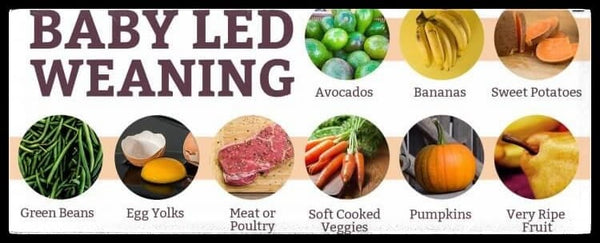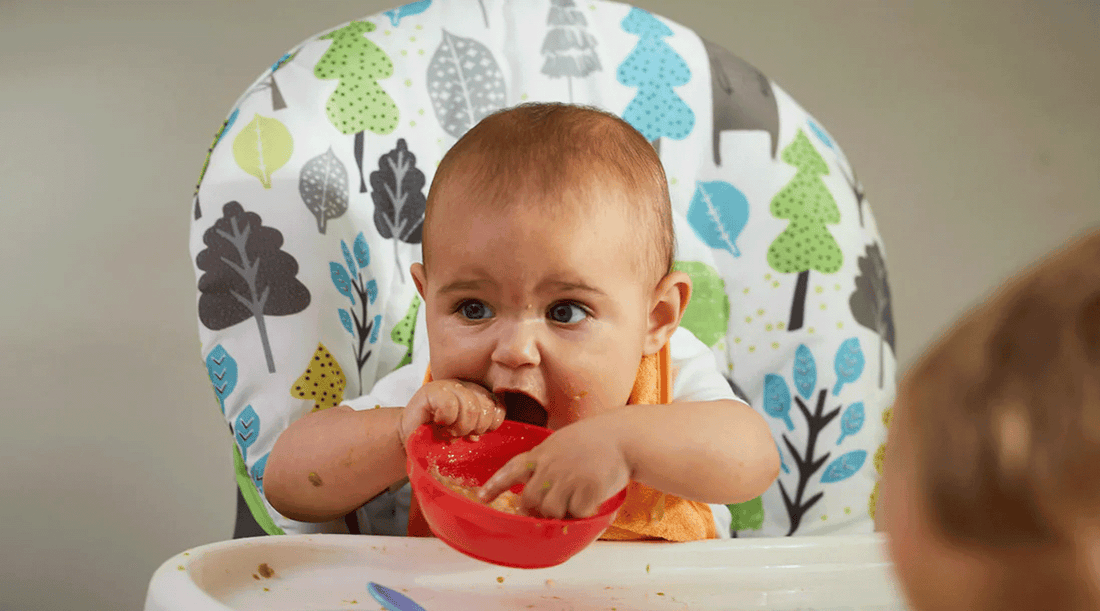Introducing solids to your little one is a much-awaited milestone for parents. Before getting started on solids you must be aware of the timelines, safety, menu, food chart, allergic reaction, choking risk, food quantity, etc. Before feeding the first morsel to your munchkin, you must be well aware of how to get started.
When to start solids for a baby?
As per WHO recommendation, infants should be exclusively breastfed for 6 months and complementary solid should be introduced in addition to breast milk after the completion of 6 months. Physically when the baby can sit up on her own and have control over her neck muscles, it is the right time to start with solids for her. There are chances that the baby may gag or spit up the food initially, do not panic as that is a normal process of them learning to eat. If the baby seems disinterested, stop feeding and try again another time.
Before 6 months, babies are not able to learn the use of their tongue to push the food at the back of their mouth. They have only learned to latch. However, some babies start to show interest in solid foods (i.e. pulling your hand towards you when you are eating your lunch. Or staring at your slice of pizza or cracker ☺. This doesn’t mean that they are ready for that food, but it means they are ready to experiment with forms and functions of food outside of liquid.
After completion of 6 months, the baby should lose the tongue-thrust reflex. This helps the food to be pushed out of the month.
While there are recommended guidelines as to what is a good time to introduce solids to babies. All babies are different and each one has his own journey. Only a mother along with the help of a care provider or pediatrician is able to decide what is best for her baby. Another sign that your baby is ready for solids is if he, after 8-10 times breastfeeding in a day, still seems to be hungry. The signs for checking for this is when the baby constantly sucks on his hand or is licking his lips.
What Not To Include In Baby's Food
Almost always, baby’s first foods should be natural, without any additives. For this reason, the first foods should be prepared at home, versus store-bought. This is easy since initially, the baby doesn’t eat much and with the latest appliances, purees, and smashes are easy to prepare and store for a limited time.
Sugar and salt should be completely avoided for babies at least until 1 year. Not only does the excessive consumption of these lead to impaired kidney function, using sugar and salts masks the taste of the actual sugar and salts present in the foods. Exposing the baby to the natural flavor of foods, including the taste of natural salts and sugars present in the food leads to the baby developing discerning tastes and makes it easier to get him to inculcate healthy eating habits as he grows up (and “I want a fussy eater” said no mom ever!). Salts and sugars in food also lead to other issues like tooth decay, decreased immunity, and hyperactivity.
Also adding honey can be dangerous for babies below 1 year. The bacteria present in honey can lead to infant botulism. It is an illness that can lead to muscle weakness and breathing difficulties. Try to avoid artificial and processed baby food as it can contain additives and preservatives. It is always best to prepare homemade puree or finger food for the baby.
How to Introduce Solids to Baby

Baby should be exclusively breastfed for 6 months and supplemental breastfeeding should be encouraged till the baby turns 2 years. Mothers can also opt for formula milk if they can't or want to breastfeed the baby. Solids should be introduced as an additional meal to your baby, it should never be substituted for breastmilk/formula milk.
Here is a small list of what would be considered the right way to introduce solids to baby
- Offer iron-rich food like pureed vegetables and fruits.
- Start with single grains or vegetables. Never combine these initially.
- Start with easy carbs needed for growth, and those that are easy on the stomach, i.e. rice.
- Avoid fortified foods as these are full of chemicals added to store-bought cereal.
- Steam cook all vegetables and puree these for easy texturing.
- Offer bright color fruit’s and vegetable as finger food to get the baby interested.
- Introduce new textures like mashed fruits, grated vegetables, etc.
- Avoid the use of animal meats early on. That said a broth of chicken or fish would be ok to give a baby above 6 months.
While introducing solids, start with iron-rich foods as it helps in the brain developed and increases red blood cell production. As solids are introduced, these need to be digested and a baby young digestive system is not ready for that function up until that point. Hence to aid digestion and avoid constipation in babies, include foods like banana, papaya, prunes, and raisin in their diet. Also, after every meal offer breastfeeds to your baby so he feels satiated and also. Follow a food chart and offer a mix of vegetables, fruits, pulses, and meat to the baby. Let the baby explore distinctive taste, flavors, and textures.
5 Best Solid Food to Start With

Make sure you start with only 1 meal and 1 veggie at a time. While offering solids to the baby, always include the vegetable/fruits as a mid-morning meal. This will give you a chance to notice any signs of allergic reaction or sensitivity. If you see any redness, rashes, or allergic reaction, reach to the doctor and avoid that particular food completely. Encourage your child to self-feed and never encourage distracting feeding. Give baby ample time to explore, taste, and enjoy the food, keep the mealtime away from the TV, smartphone, or any other distraction.
Try to include vegetables every day in the baby's food chart. Avoid giving any solids post at 7 pm. Put your baby to sleep after breastfeeding around 8 pm. This will help your baby to follow a sleep routine and help the process of digestion to be developed. A healthy nap time routine like a bath or a gentle massage also helps in this process.
Some of the great first foods to introduce between 6-8months are:
- Rice
- Sweet vegetables like sweet potato and Carrots
- Oats or wheat Porridge
- Avacado
- Idli
What to expect why your baby starts solids for the first time?
Be ready to witness the cuteness overload! She might enjoy the food or make funny faces or split it out. It is normal because she is just reacting to new flavors and tastes. Introducing solid is a messy job so be prepared with a camera and take lots of pictures.
Introducing solids is a very important parenting milestone. Incorporating healthy eating practices early on in a baby's life will help in his health in the future as well. Because the early introduction of healthy food habits stays with them forever.

